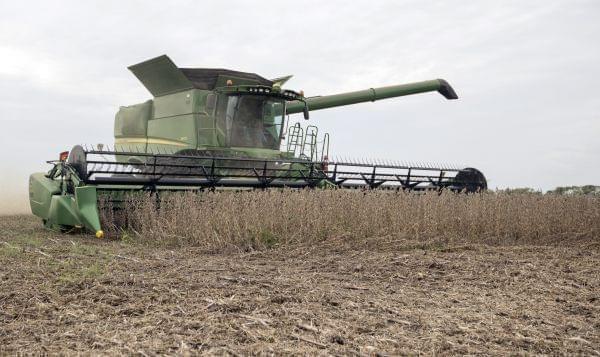Farming, Wet Weather And Trade; A ‘Reverse Great Migration’; Attorney General Kwame Raoul

Farmer Mike Starkey harvests his crops in Brownsburg, Ind. on Sept. 21, 2018. Michael Conroy/AP
Planting season in Illinois has been massively delayed as we face one of the wettest springs in more than a century. So, how are farmers coping with all of this uncertainty? Plus, African-Americans have been moving out of Chicago for years, not just to suburbs or other parts of Illinois, but also to areas in the South. And, Attorney General Kwame Raoul tells us why he's worried that alternative energy suppliers are preying on consumers and charging high utility bills.
It’s been a cold and wet spring here in Illinois, one of the wettest in 124 years, according to the state climatologists office. Spring showers are a nuisance for most of us, but too much rain can be disastrous for farmers who aren’t able to get their seeds in the ground.
To make things worse, the trade war with China continues to heat up.
How are farmers coping? We thought we would check in with a few folks who’ve been following this closely, including Steve Fourez. He farms about 500 acres of corn and soy in Vermillion County in East Central Illinois.
Madelyn Beck is a reporter for Harvest Public Media. Scott Irwin is the Laurence J. Norton Chair of Agricultural Marketing in the college of ACES at the University of Illinois.
The vast majority of the state has seen above average rain AND snowfall, explains @MadelynBeck8. This May is already shaping up to be a really wet one.
— The 21st (@21stShow) May 21, 2019
If farmers were able to get crops in before Easter, farmers may have to replant them she says. It's just that wet.
Also--
During the 20th century an estimated six million African-Americans left the south and came to northern and midwestern cities like Chicago, Detroit and New York. They came for better job opportunities and to escape Jim Crow laws. It’s known as the Great Migration.
Today, our economic picture looks very different, especially here in the Midwest. As you may know, Illinois has been losing residents for five straight years. We’ve talked a lot about college students leaving. But there’s another group that’s leaving in big numbers, and that’s African-Americans, and especially when it comes to the city of Chicago. Some are going to the suburbs or to other cities in Illinois, but others are also leaving the Midwest altogether and going back to the South.
This decline is so stark that the Urban Institute projects that Chicago’s black population will shrink to 665,000 by 2030. That’s basically half of what it was in the 1980s.
All this week NPR is profiling what full employment looks like across the country.
NPR’s Jim Zarolli was with us from New York. We’ve also got Alden Loury joining us from WBEZ in Chicago, where he’s the senior editor of the station’s race, class and communities desk. William Sampson teaches public policy at DePaul University in Chicago, where he studies race, housing and poverty.
The unemployment rate for African American is the best it's ever been explains, @JimZarroli. And this means there are opportunities in the South. We're seeing a reversal in migration patterns that has intensified in recent years. @NPR https://t.co/Kdgj18hih4 pic.twitter.com/j27fnKGxcA
— The 21st (@21stShow) May 21, 2019
Plus--
It’s that time of year when you don’t know if you need heat or AC. Either way, that can lead to high energy bills, whether you’re using a traditional utility company, or if you’ve signed up for an alternative energy supplier.
Have you gotten those letters at home that ask you to switch companies?
The state attorney general’s office says that consumers should be careful with alternative energy suppliers and their marketing practices. In fact, the office says that a lack of transparency and deceptive promises have led to consumers paying hundreds of millions of dollars more in electricity.
Attorney General Raoul is now pushing a bill called the Home Energy Affordability and Transparency Act, or HEAT Act, that he says will help address this problem. We spoke to Attorney General Raoul earlier this morning.
The bill is also supported by other consumer advocacy groups including the Citizens Utility Board. Their director David Kolata joined us today.
Regarding #Abortion, @KwameRaoul adds that he feels secure about a woman's access to health care. "I'm not just a law enforcement officer for the state, I'm an advocate."
— The 21st (@21stShow) May 21, 2019
